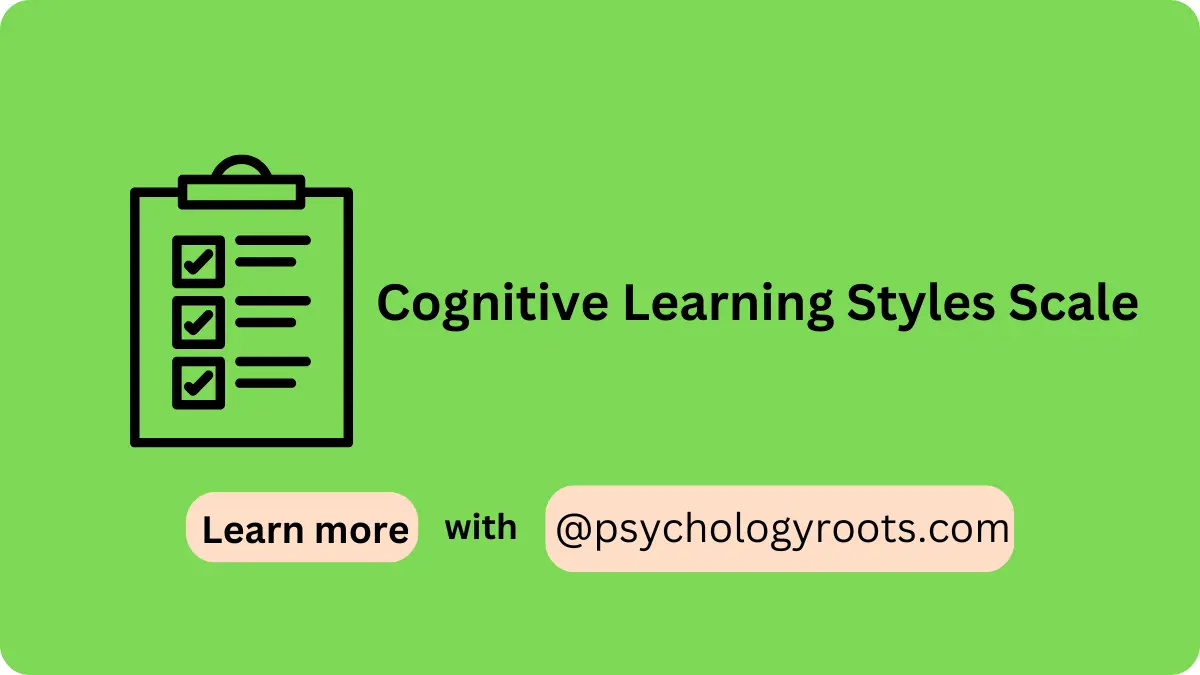Table of Contents
Cognitive Learning Styles Scale
Here in this post, we are sharing the “Cognitive Learning Styles Scale”. You can read psychometric and Author information. We have thousands of Scales and questionnaires in our collection (See Scales and Questionnaires). You can demand us any scale and questionnaires related to psychology through our community, and we will provide you with a short time. Keep visiting Psychology Roots.
About Cognitive Learning Styles Scale
Scale Name
Cognitive Learning Styles Scale
Author Details
Developed by Moshirian Farahi, S. M. M., & Leth-Steensen, C. (2022); based on the theoretical framework by Qian N. and Lipkin R. M. (2011).
Translation Availability
English

Background/Description
The Cognitive Learning Styles Scale (CLSS) is an innovative instrument designed to assess the cognitive preferences and approaches individuals adopt in learning processes. Developed through theoretical and empirical research, the scale is particularly valuable in understanding cognitive learning styles related to the autism spectrum.
This scale integrates insights from Qian and Lipkin’s theory of learning styles in autism (2011), which explores how individuals on the autism spectrum approach problem-solving and information processing. Furthermore, Moshirian Farahi and Leth-Steensen (2022) extended this work, designing a psychometrically robust measure to capture these unique cognitive learning styles systematically.
The CLSS is instrumental in educational psychology, developmental assessments, and intervention planning. Its comprehensive framework allows researchers and practitioners to differentiate cognitive learning styles, thereby tailoring interventions and educational strategies to individual needs.
Administration, Scoring and Interpretation
- Obtain a copy: Access the scale through publications by the authors or reputable sources such as BMC Psychiatry.
- Explain the purpose: Inform participants that the scale assesses cognitive preferences to enhance learning and adaptive strategies.
- Provide instructions: Guide respondents to answer honestly based on their typical learning and problem-solving approaches.
- Approximate time: The scale takes approximately 15–25 minutes to complete.
- Administer the scale: Provide a distraction-free environment for participants to complete the questionnaire.
Reliability and Validity
- Reliability: The scale has demonstrated high internal consistency, as reported by Moshirian Farahi and Leth-Steensen (2022), ensuring reliable assessment across diverse populations.
- Validity: The CLSS shows strong construct validity, grounded in Qian and Lipkin’s (2011) learning style theory and corroborated through empirical testing. Its alignment with autism-related cognitive styles enhances its applicability in clinical and research settings.
Available Versions
60-Items
Reference
Moshirian Farahi, S. M. M., & Leth-Steensen, C. (2022). Development of a novel, theoretically motivated scale to assess cognitive learning styles related to the autism spectrum. BMC psychiatry, 22(1), 696.
Qian, N., & Lipkin, R. M. (2011). A learning-style theory for understanding autistic behaviors. Frontiers in human neuroscience, 5, 77.
Important Link
Scale File:
Frequently Asked Questions
Q1: What is the purpose of the Cognitive Learning Styles Scale?
The scale identifies individual differences in cognitive learning styles, with a focus on autism spectrum-related behaviors.
Q2: Who can benefit from using this scale?
Educators, psychologists, and researchers interested in understanding and supporting diverse cognitive learning preferences, particularly in individuals on the autism spectrum.
Q3: Is the scale suitable for non-autistic populations?
Yes, while it emphasizes autism spectrum behaviors, the scale is applicable to general populations to explore cognitive learning styles.
Q4: Can the scale be used in educational settings?
Yes, it helps educators tailor teaching strategies to align with individual cognitive learning preferences.
Q5: How can the results inform interventions?
The results highlight unique learning patterns, guiding the development of personalized educational or therapeutic plans.
Disclaimer
Please note that Psychology Roots does not have the right to grant permission for the use of any psychological scales or assessments listed on its website. To use any scale or assessment, you must obtain permission directly from the author or translator of the tool. Psychology Roots provides information about various tools and their administration procedures, but it is your responsibility to obtain proper permissions before using any scale or assessment. If you need further information about an author’s contact details, please submit a query to the Psychology Roots team.
Help Us Improve This Article
Have you discovered an inaccuracy? We put out great effort to give accurate and scientifically trustworthy information to our readers. Please notify us if you discover any typographical or grammatical errors.
Make a comment. We acknowledge and appreciate your efforts.
Share With Us
If you have any scale or any material related to psychology kindly share it with us at psychologyroots@gmail.com. We help others on behalf of you.